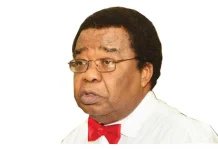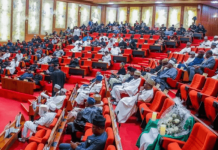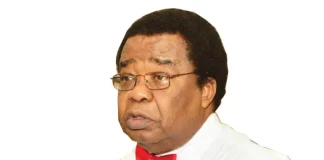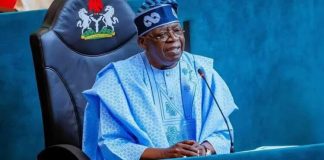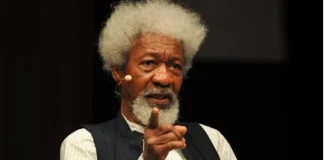🌿 Ruzu Non-Alcoholic Herbal Bitters
Ruzu Non-Alcoholic Herbal Bitters is a natural health supplement specially formulated to:
- ✅ Promote general wellness
- ✅ Detoxify the body
- ✅ Support the treatment of various ailments
Made from a powerful blend of 100% organic and medicinal herbs, Ruzu is completely alcohol-free, making it ideal for:
- 👪 All age groups
- 🌱 Health-conscious individuals
- 🌿 Anyone seeking non-alcoholic herbal remedies
Whether you're looking to boost your vitality, cleanse your system, or support healing the natural way, Ruzu Bitters offers a trusted herbal solution.
Since the 1980s, Nigeria has struggled with energy supply, and there have been multiple “National Grid” collapses in recent years. The federal government has urged the federation’s states to make significant investments in power projects in order to find a long-term solution to the country’s electricity blackout problem.
At the Nigeria Energy Leadership Summit on Tuesday, October 27, 2025, Power Minister Adebayo Adelabu stated that it is the only way to stop the ongoing power grid breakdowns.
The power sector appears to have resisted all attempts by succeeding governments to sanitize the industry, despite several attempts to provide power to Nigerians.
Speaking at the conference, Adelabu stated that President Bola Tinubu’s administration signed the Electricity Act in 2023 because the Federal Government knew that power centralization would never work for Nigeria.
“In terms of law, the passing of the Electricity Act 2023 continues to be a significant turning point. It is, in fact, the pathfinder.
It gives the Nigerian energy supply business a strong foundation for governance and regulation.
The Act allows private participation throughout the value chain, facilitates subnational markets, encourages competition, and transfers regulatory authority to the states.
Decentralization and liberalization are two effects of this legislation. Centralization is ineffective for a nation the size of Nigeria, which has a landmass of nearly a million square kilometers, a population of over 200 million, millions of businesses, thousands of institutions (including health and educational institutions), 36 states plus the Federal Capital Territory, and 774 local governments.
It is impossible to entrust the Federal Government with the duty of supplying reliable electricity.
“At the national level, stable power cannot be guaranteed from Abuja. Decentralization is thus one of the things that the Act has accomplished. This has made it possible for all states or subnationals to participate in the generation, transmission, distribution, and even service businesses that support the electricity sector, he said.
According to Adelabu, the Federal Government is now working on a comprehensive plan to reposition the power industry for growth, efficiency, and sustainability.
Legislation, legislative changes, infrastructure development, energy transition, asset expansion, local content, and capacity building are all important elements of this strategy. In order to achieve functional, dependable, and reasonably priced electricity throughout Nigeria to power our homes, businesses, offices, institutions, and industries, thereby enhancing the economic prosperity of our people, each is intended to address structural challenges, unlock private capital, and improve service delivery across the electricity value chain,” he stated.
The minister insisted that if the country is serious about having a dependable power sector, the private sector must get engaged.
The government will never be able to provide the necessary investment. Education, health, defense, employment, aviation, and other sectors are all excessively competitive. They all vie for the federal government’s meager resources. We therefore need private capital infusion, both domestic and foreign, considering the amount of investment needed in this area. The rich countries have contributed and continue to support us, but without the involvement of private sector investment, it will never be sufficient. This legislation has that benefit, and I think the states and private sector investors are capable of handling it.
The Act empowers private participation throughout the value chain, facilitates supply chain marketplaces, encourages competition, and transfers regulatory authority to the states. He emphasized, “This clearly shows a shift towards a liberalized and investment-friendly electricity market.”
Adelabu stated that since the Electricity Act was passed, 15 states have gained regulatory authority and created subnational electricity markets, with Enugu being fully operationalized through the Enugu Electricity Regulatory Commission.
“With the full cooperation of the national regulator, I think other states will follow suit in operationalizing the granted autonomy.” To guarantee that the wholesale and retail markets are strongly aligned, we are actively collaborating with these states.
“Given the Rural Electrification Agency’s roundtable meetings with governors and continuous efforts to closely monitor the distribution companies’ performance within their respective jurisdictions, we think the state governments’ active involvement is crucial in this regard, especially in the off-grid segment.
Adelabu emphasized, “Abba Aliyu, the Managing Director of REA, has met with nearly 20 states regarding the national electrification program across the country. This is an opportunity and a platform for the subnationals to leverage and start to activate the autonomy they have been granted.”


